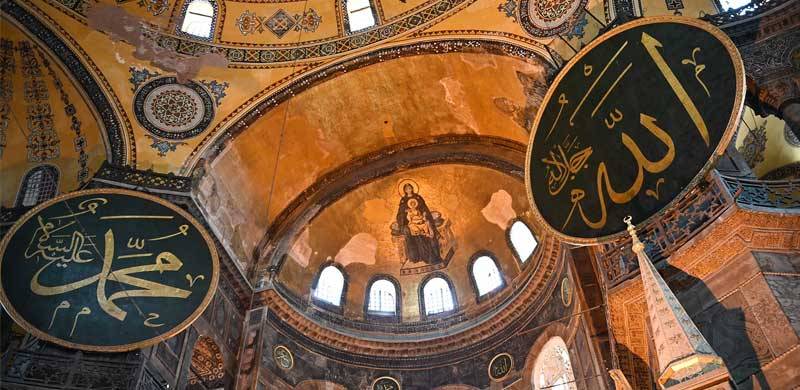
Turkey exercised its right to make the decision of converting the Hagia Sophia museum to a mosque, based on its political and religious preference just like any other country in the world, so a criticism of the development does not seem justified, writes Haseeb Akhtar.
From Orthodox Christian Cathedral to a Muslim mosque and then from museum to again mosque, 'Hagia Sophia' has a history of 1,500 years. It was completed in 537 AD during the rule of Roman Emperor Justinian 1 and was then converted into a mosque in 1453 when the Ottoman Sultan Fateh Mehmet II conquered Istanbul. Back in 1934, secular Turkish leader Mustafa Kamal Ataturk, changed the mosque into a museum.
The Turkish top court's ruling on July 10 paved the way of restoration of Hagia Sophia as a mosque. Turkish President Recep Tayyip Erdagon, after an hour of the court decision, signed the notification of handling Hagia Sophia to the Turkish Directorate of Religious Affairs. He said in his statement that this site will remain open to Muslims, Christians and all foreigners.
Earlier, Hagia Sophia was known as a universal religious site and was placed on the UNESCO list of world heritage sites. It was a famous tourist destination of the world, and in 2019, Turkey earned 3.7 million US dollars from this museum. But now, the Turkish government has announced that it will not charge any entry fee for anyone entering the structure.
However, an uproar was witnessed in the international media against the conversion after President Erdogan's announcement of opening the mosque on July 14 with a Friday prayer. The whole world seemed infuriated with Turkey. The UNESCO announced to review the world heritage status of the site. Pop Francis expressed his displeasure saying, “I am very sad and pained over Hagia Sophia.” The World Council of Churches demanded Erdogan to reverse the decision. The head of the Greek Orthodox Church also condemned the move. US foreign secretary Mike Pompeo also expressed concerns over the development.
The international community and global media is still criticising Turkish president, saying he did so to secure more votes from the religious quarter. But what one may think is, where were these international actors in 1992 when Hindu extremists demolished Babri mosque in India. Why didn’t they condemn the verdict of the Indian Supreme Court, which was in favor of the Hindu temple? Why these global human rights activists and civil society did not oppose the discriminatory Citizen Amendment Act in India? They also remained silent when Israel converted the historical Alehmar mosque into a night club. Now, why is there so much criticism aimed at Turkey?
What one should observe is that there is global rise in right wing politics, and every country is doing this either in the West or the East, Muslims or Non-Muslims. Each country around the world works to protect and promote their religious identity and right wing political leaders cash votes on religious fundamentalism. How can we have double standards and tell Muslim countries not to do the same?
In the US, there is a mosque for every 1,600 Muslims, one mosque for every 2,875 Muslims in Russia, one mosque for every 2,400 Muslims in France, one mosque for every 1,707 Muslims in Britain, one mosque for every 2,200 Muslims in Germany and one mosque for every 1,728 Muslims in Holland, whereas there is one church for every 461 Christians in Turkey. This proves that Turkey is much ahead than the US and Europe in terms of religious harmony.
Recep Tayyip Erdogan rightly said in response to the criticism of the opponents of the move. “Those who do not take a step against Islamophobia in their own countries are attacking Turkey’s will to use its sovereign rights”. This decision was reflective of Turkish sovereign rights as is the case in other countries where governments exercise the right and implement their policies, based on their religious or political preferences.
Lastly, we should remember that Turkey also has an Ottoman legacy attached to Hagia Sophia and this is why a large number of Turkish people welcomed and celebrated the decision.
Disclaimer: The views expressed by the author do not necessarily reflect the editorial stance of NayaDaur Media
